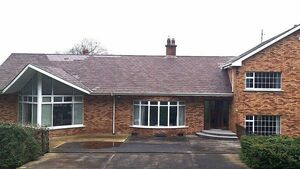Laois home for disabled children failed eight HIQA standards

Corrig Woods residential centre in Laois cares for children aged 6-18 with autism and intellectual disabilities. Photo: Lotus Care Ltd
A LAOIS care home for children with disabilities failed eight regulations when it was inspected by the Health Information and Quality Authority (HIQA).
During a short-notice inspection, the residential centre for children aged six to 18 did not comply with a series of important care standards.
Corrig Woods in Portarlington, which caters for children with autism and intellectual disabilities, was purchased by private operator Lotus Care Ltd in late 2022 and was registered with HIQA only a year ago.
During the inspection, the five-bedroom care home was found to be noncompliant in eight out of 19 categories, including risk management, residents’ rights and the general welfare and development of children.
The 34-page report on Corrig Woods says that after ‘a serious incident of a child protection nature’ last October, the provider ‘did not carry out any review or disseminate any learning to staff’ and the incident was not considered from a risk management perspective.
The HIQA chief inspector said: ‘The incident was immediately brought to the attention of the provider for review. The provider had failed to follow its own and national safeguarding processes, the provider did not screen the incident, did not meet its obligations under Children's First Guidance and did not notify the chief inspector of social services about the incident.
‘The incident had the potential to significantly impact on the safety and welfare of the children involved. The provider immediately accepted that this was an error and agreed to take appropriate steps to retrospectively address the incident, in line with national guidance and its own procedures.’
The two-day HIQA inspection was carried out last January but the authority’s report was not published until last month, indicating that there was significant correspondence between the provider and the regulator to improve facilities.
All children in the centre were nonverbal, but they were helped to communicate with visual aids.
Risk assessments were not carried out for two children and no follow-up plans or development programmes were on file, which caused concern for the inspectors.
Inspectors were unable to confirm the legal status of two children at the home as the admissions process was unclear. Contracts signed by the guardians of the children included references to a completely different facility.
The report says that the registered provider did not have an active policy regarding volunteers. A student volunteer was working with a child last October but there was no written agreement outlining their role or responsibilities.
A senior manager confirmed to the inspectors at the time of their visit that no students or other volunteers were working or planned to work with the children. They also confirmed that there was a draft policy pertaining to volunteers, but it was not active or approved.
Noncompliant findings included a lack of individual assessment and personal plans for the children and admissions paperwork not being in order. These failings were rated as a ‘red’ risk, meaning the operator had to begin a process to comply with regulations immediately.
The report also found that staff at Corrig Woods set ‘limited and repetitive activities’ in the case of at least two of the four children living at the facility.
One timetable repeated the same four activities for months: playground visits, social drives, walks in the woods and house play. Staff could not show the two inspectors who visited the home any evidence of other organised activities.
The report also found insufficient evidence that children had choice and control in their daily lives.
However, the report highlights many positive aspects of care at Corrig Woods and says that staff and management were committed to looking after the children and meeting their needs in full, while the two children the inspectors observed were happy and in good care.
The centre was also fully staffed and the provider had the capacity to fill any gaps in the 19-strong roster. The manager was appropriately qualified and experienced and was very open to feedback throughout the inspection, acknowledging that significant work was required in areas such as risk, personal planning and staff development.
HIQA said that, in the days and weeks following the inspection, Lotus Care Ltd implemented a comprehensive personal plan for each child at the facility so that a person-centred care approach is taken to the children’s development goals.
A full-time staff member was appointed to the centre with a focus on the general welfare and development of the children as part of a compliance plan.
The firm also updated its preadmission risk assessment programme so that the status of each child and their development can be addressed and planned. Paperwork giving staff access to school records has been completed to further the children’s development.
Additional training, including autism awareness classes, were scheduled for staff at Corrig Woods. A risk management committee was also established and meets monthly.
The private company owns and operates four other residential care centres for people with disabilities in Leinster, all of which have been compliant in most standards of care, according to recent inspections.
Lotus Care Ltd has been contacted for comment.




